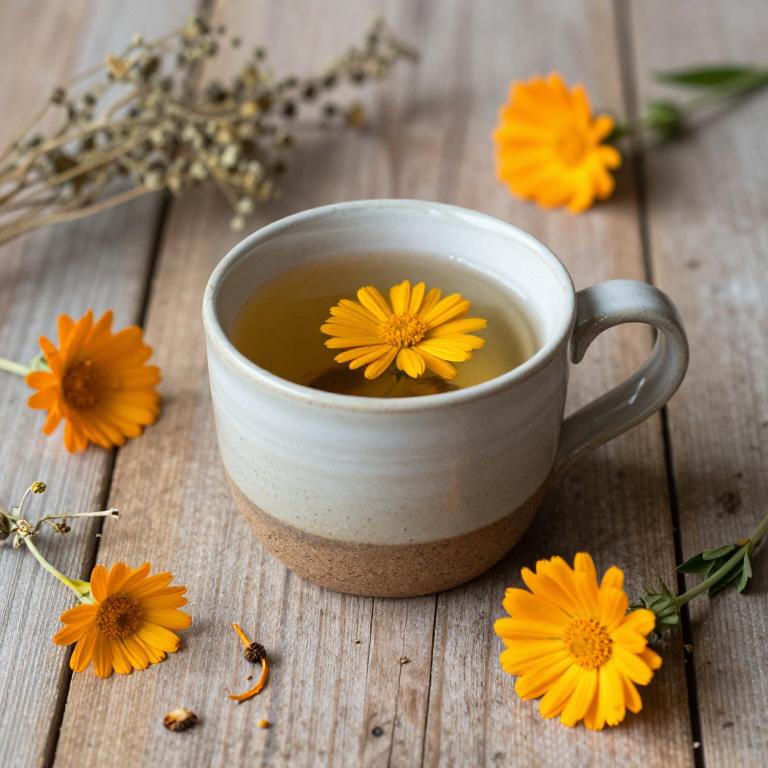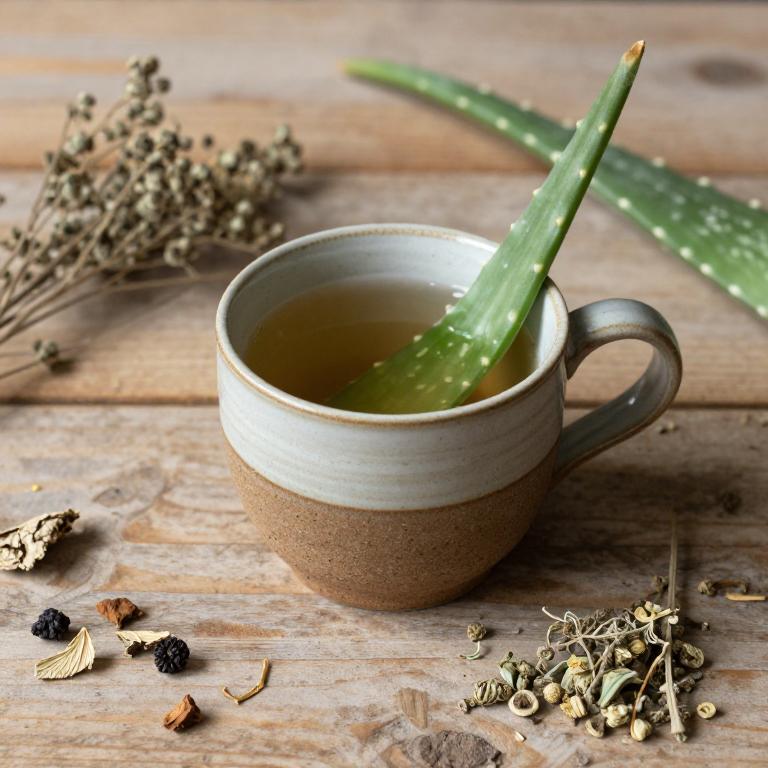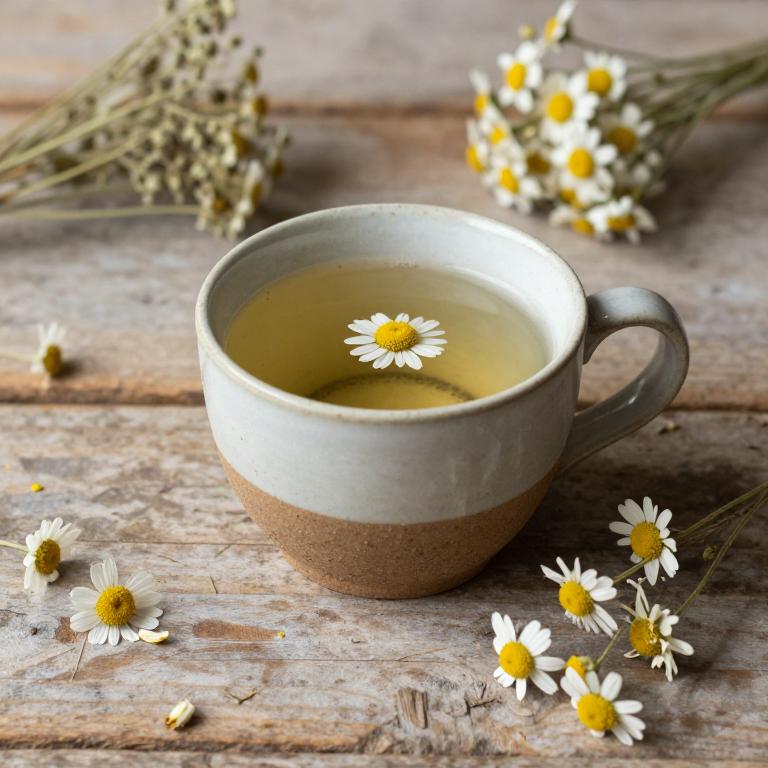10 Best Herbal Teas For Burns

Herbal teas can be a soothing and natural remedy for minor burns, offering a gentle alternative to conventional treatments.
Certain herbs such as chamomile, calendula, and lavender are commonly used in herbal teas due to their anti-inflammatory and antiseptic properties. To use these teas, they should be cooled to a comfortable temperature before being applied to the affected area using a clean cloth. This method can help reduce pain, swelling, and the risk of infection.
However, it is important to consult a healthcare professional for more severe burns or if symptoms persist.
Table of Contents
- 1. Marigold (Calendula officinalis)
- 2. St. john's wort (Hypericum perforatum)
- 3. Stinging nettle (Urtica dioica)
- 4. Aloe vera (Aloe barbadensis)
- 5. Dog rose (Rosa canina)
- 6. English lavender (Lavandula angustifolia)
- 7. Camellia (Camellia sinensis)
- 8. German chamomile (Chamomilla recutita)
- 9. Blessed thistle (Cnicus benedictus)
- 10. Thistle (Silybum marianum)
1. Marigold (Calendula officinalis)

Calendula officinalis, commonly known as pot marigold, is a popular herb used in herbal teas to soothe burns due to its anti-inflammatory and antimicrobial properties.
When brewed into a tea, calendula can help reduce redness, swelling, and pain associated with minor burns and skin irritations. The tea is often applied topically as a compress or used internally to support the body’s healing process. It is particularly effective for first-degree burns and sunburns, offering a natural alternative to conventional treatments.
However, it is important to consult a healthcare professional before using calendula tea, especially for more severe burns or if you have allergies to plants in the Asteraceae family.
2. St. john's wort (Hypericum perforatum)

Hypericum perforatum, commonly known as St. John's Wort, is traditionally used in herbal teas to aid in the healing of burns due to its anti-inflammatory and antiseptic properties.
The tea is believed to help reduce pain and promote skin regeneration by soothing the affected area. While it is often used externally as a compress or topical application, some people may consume it internally to support overall healing. However, it is important to consult a healthcare professional before using St. John's Wort, as it can interact with certain medications.
Despite its traditional use, scientific evidence supporting its effectiveness for burns is limited, and it should not replace conventional medical treatments.
3. Stinging nettle (Urtica dioica)

Urtica dioica, commonly known as stinging nettle, has been traditionally used in herbal medicine for its anti-inflammatory and soothing properties.
When prepared as a tea, it can be applied topically to burns to help reduce inflammation and promote healing. The tea contains compounds like flavonoids and antioxidants that may support skin regeneration and ease discomfort. However, it is important to note that while some people use nettle tea for minor burns, it should not replace professional medical treatment for severe burns.
Always consult a healthcare provider before using any herbal remedy, especially on open wounds or burns.
4. Aloe vera (Aloe barbadensis)

Aloe barbadensis, commonly known as aloe vera, is often used in herbal teas to soothe burns due to its anti-inflammatory and moisturizing properties.
These teas are typically made by steeping dried aloe leaves or aloe-based extracts in hot water, allowing the beneficial compounds to infuse into the liquid. While aloe vera tea may provide some relief by reducing redness and promoting skin healing, it is important to note that it should not replace medical treatment for severe burns. The gel form of aloe vera is generally more effective for topical application than the tea, as it contains higher concentrations of active compounds.
Nevertheless, drinking aloe vera tea can contribute to overall hydration and support the body's natural healing processes.
5. Dog rose (Rosa canina)

Rosa canina, also known as dog rose, is a traditional herbal remedy that has been used for centuries to support skin health and healing.
Its flowers and hips are commonly used to make herbal teas that may help soothe burns due to their high content of antioxidants and anti-inflammatory compounds. The tea is believed to promote skin regeneration and reduce pain and redness associated with minor burns. When applied topically or consumed internally, Rosa canina tea may enhance the body's natural healing process.
However, it is advisable to consult a healthcare professional before using it for burns, especially for severe cases.
6. English lavender (Lavandula angustifolia)

Lavandula angustifolia, commonly known as English lavender, is often used in herbal teas to soothe burns due to its calming and anti-inflammatory properties.
The essential oils in lavender, such as linalool and lavandulol, have been shown to reduce pain and promote healing in minor burns. When brewed into a tea, lavender can help ease discomfort and reduce redness when applied topically or consumed internally. However, it is important to note that while lavender tea may offer some relief, it should not replace professional medical treatment for severe burns.
Always consult a healthcare provider before using herbal remedies for burns, especially if the injury is extensive or shows signs of infection.
7. Camellia (Camellia sinensis)

Camellia sinensis, the plant from which green and black teas are derived, contains bioactive compounds such as polyphenols and catechins that have been studied for their potential anti-inflammatory and antioxidant properties.
While it is not a substitute for medical treatments, some herbal teas made from Camellia sinensis may offer mild relief for minor burns by reducing inflammation and promoting skin healing. These teas can be applied topically as a compress or consumed internally to support the body's natural recovery processes. However, it is important to note that severe burns require immediate medical attention, and herbal teas should not replace professional care.
Always consult a healthcare provider before using any herbal remedy for burns.
8. German chamomile (Chamomilla recutita)

Chamomilla recutita, commonly known as German chamomile, is a popular herbal remedy often used in the form of tea to soothe burns and skin irritations.
Its anti-inflammatory and antiseptic properties help reduce redness, swelling, and pain associated with minor burns and sunburns. To use chamomile tea for burns, it is typically cooled and applied as a compress or used to soak a clean cloth, which is then placed on the affected area. While it may provide relief, it is important to note that chamomile tea should not replace professional medical treatment for severe burns.
Overall, chamomile tea can be a gentle and natural option for alleviating the discomfort of minor burns when used as part of a holistic care approach.
9. Blessed thistle (Cnicus benedictus)

Cnicus benedictus, commonly known as St. Benedict's thistle, has been traditionally used in herbal medicine for its potential soothing properties.
While it is not a primary treatment for burns, some herbal teas made from this plant may offer mild relief by reducing inflammation and promoting skin healing. The anti-inflammatory compounds in Cnicus benedictus may help alleviate discomfort associated with minor burns when applied topically. However, it is important to consult a healthcare professional before using it for burns, as severe burns require immediate medical attention.
Although herbal teas can complement conventional treatments, they should not replace professional medical care for burn injuries.
10. Thistle (Silybum marianum)

Silybum marianum, also known as milk thistle, is a herbal remedy that has been traditionally used for its potential healing properties.
While it is primarily known for its liver-protecting benefits, some studies suggest that silybum marianum may also have anti-inflammatory and antioxidant effects that could aid in the treatment of burns. Herbal teas made from silybum marianum are often used topically to soothe skin irritation and promote tissue repair. However, it is important to note that more research is needed to confirm its effectiveness for burn treatment.
As with any herbal remedy, it is advisable to consult a healthcare professional before using silybum marianum for burns, especially if you have underlying health conditions or are taking other medications.